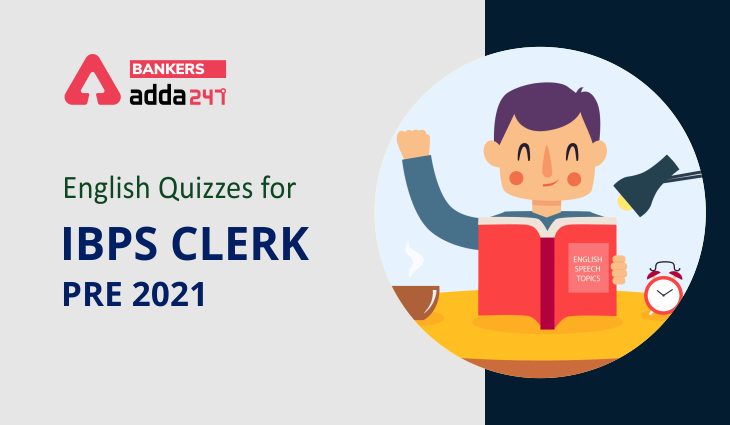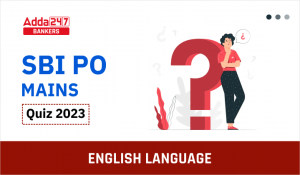
TOPIC: Miscellaneous
Direction (1-3): Read each sentence to find out whether
there is any grammatical or idiomatic error in it. The error, if any, will be
in one part of the sentence. The number of that part is the answer. If there is
‘No error’, the answer is (e). (Ignore errors of punctuation, if any.)
Q1. He was
determined to (a)/ participate in the car race (b)/ even though he knew (c)/
that he will not succeed. (d)/ No error. (e)
Q2. The father
forbade his son (a)/ to walk in the sun (b)/ and play with (c)/ his friends on
the road (d)/ No error (e)
Q3. They
exclaimed with delight that it (a)/ was a very beautiful picture (b)/ and said
that they have never seen (c)/ such a beautiful picture before (d)/ no error
(e)
Directions (4-8):
Rearrange the following sentences (A),
(B), (C), (D), (E), (F) in the proper sequence to form a meaningful paragraph;
then answer the questions given below them.
(A) These
countries did not fall prey to fiscal profligacy.
(B) India had a
very similar experience in 1991.
(C) What
happened in Asia was quite different.
(D) Their main
stress points were in the private sector—too much corporate debt, a credit
bubble and lax lending standards to crony capitalists.
(E) Countries
with high fiscal deficits that were funded through money creation by the
central bank would eventually see their external accounts come under pressure.
(F) The popular
view of balance of payments crises was derived from the experience of Latin
America in the previous decade.
Q4. Which of
the following should be the FIFTH
sentence after rearrangement?
(a) B
(b) F
(c) A
(d) E
(e) C
Q5. Which of
the following should be the THIRD
sentence after rearrangement?
(a) A
(b) D
(c) B
(d) E
(e) F
Q6. Which of
the following should be the FIRST sentence
after rearrangement?
(a) B
(b) F
(c) D
(d) C
(e) E
Q7. Which of
the following should be the SECOND
sentence after rearrangement?
(a) F
(b) E
(c) A
(d) B
(e) C
Q8. Which of
the following should be the LAST
sentence after rearrangement?
(a) D
(b) A
(c) B
(d) F
(e) E
Directions
(9-15): In the following passage, some
of the words have been left out, each of which is indicated by a number. Find
the suitable word from the options given against each number and fill up the
blanks with appropriate words to make the paragraph meaningfully complete.
The Asian
crisis has taught us that economic dislocations can __(9)____from the private sector rather than the government budget;
maintaining fixed exchange rates in a world of free __(10)___ flows is almost impossible; currency panics can be
self-fulfilling, so capital controls should be used in rare cases as an
emergency tool; countries need to think deeply about their economic development
models, especially if they have become __(11)_____
as they move up the value chain.
The Asian
tigers eventually bounced back—but they have never been able to match the
performance of the years before the __(12)_____.
The structural transformation of these economies can perhaps best be __(13)____ in the story of the Korean
chaebol, such as Samsung or Hyundai, which reinvented themselves as engines of
global innovation while others, such as Daewoo, were allowed to die. China is
in the middle of a similar transition right now. It remains to be seen _(14)____ it can change its economic
model without ___(15)___ disruption.
Q9. (a) happen
(b) yield
(c) appear
(d) turn up
(e) emanate
Q10. (a) budget
(b) fund
(c) capital
(d) goods
(e) credit
Q11. (a)
ancient
(b) frumpish
(c) obsolete
(d) outdated
(e) recent
Q12. (a) crises
(b) incident
(c) problem
(d) dilemma
(e) event
Q13. (a)
checked
(b) learned
(c) tested
(d) seen
(e) manifested
Q14. (a) that
(b) whether
(c) through
(d) by
(e) over
Q15. (a) such
(b) severe
(c) sudden
(d) genuine
(e) much
ALSO CHECK:
SOLUTIONS
S1. Ans. (d)
Sol. ‘would’
will be used in place of ‘will’ because in starting clause of “even though” ‘he
knew’ is in past tense, therefore in “that-clause” also Past tense will be
used.
S2. Ans. (e)
Sol. The
sentence is grammatically correct.
S3. Ans. (c)
Sol. Use ‘had’
in place of ‘have’ because reporting speech ‘said’ is in past tense therefore
in reported speech, in place of present perfect, past perfect tense will be
used.
S4. Ans. (c)
Sol. The
correct sequence of sentences is FEBCAD
S5. Ans. (c)
Sol. The
correct sequence of sentences is FEBCAD
S6. Ans. (b)
Sol. The
correct sequence of sentences is FEBCAD
S7. Ans. (b)
Sol. The correct
sequence of sentences is FEBCAD
S8. Ans. (a)
Sol. The
correct sequence of sentences is FEBCAD
S9. Ans. (e)
Sol. “emanate”
is the correct word to fill the gap as it means originate from; be produced by.
S10. Ans. (c)
Sol. “world of
free capital” is the correct phrase in context of the meaning of the sentence.
The word ‘capital’ means people who possess wealth and use it to control a
society’s economic activity, considered collectively.
S11. Ans. (d)
Sol. “outdated”
is the correct word to fill the gap as it means out of date. Other words are
almost similar but they are not the most appropriate in adding meaning to the
sentence.
S12. Ans. (a)
Sol. “crises”
is the correct word to fill the gap as it means a time of intense difficulty or
danger.
S93. Ans. (d)
Sol. “can
perhaps best be seen” is the correct phrase in context of its meaning of the
sentence.
S14. Ans. (b)
Sol. “whether”
is the correct word as it means expressing a doubt or choice between
alternatives.
S15. Ans. (b)
Sol. “severe”
is the correct word as it means strict or harsh.




 English Quizzes For SBI PO Mains 2023 - ...
English Quizzes For SBI PO Mains 2023 - ...

